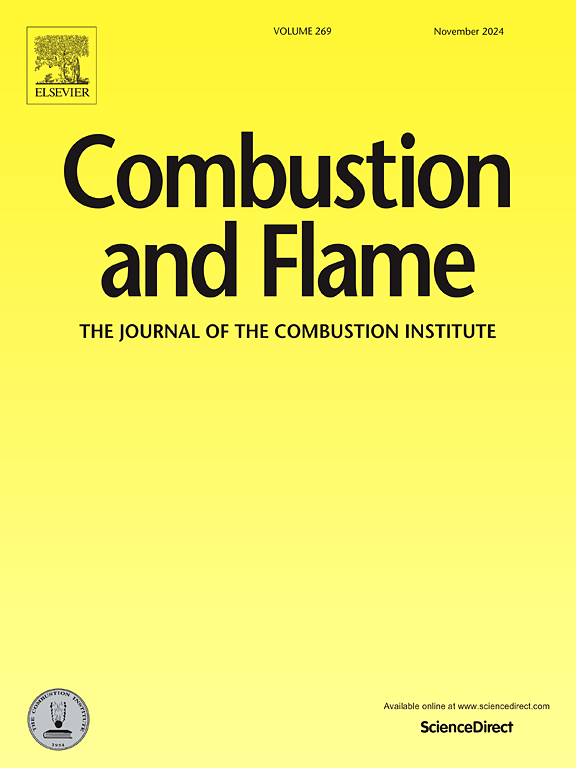噪声强度对热声不稳定预警指标的影响:对贫油预混燃烧系统的实验研究
IF 5.8
2区 工程技术
Q2 ENERGY & FUELS
引用次数: 0
摘要
在这项工作中,我们通过实验研究了在天然气-空气混合物中运行的贫油预混燃烧系统的噪声诱导动力学,该系统通过次临界霍普夫分岔表现出热声不稳定性。研究是在以等效比 (ϕ) 为控制参数的双稳态区域之前进行的。我们分析了燃烧器中的声压振荡(p′),以及在白噪声水平不断增加的情况下,层流准平焰的热释放率(q′)的波动。我们展示了噪声强度对各类预警指标(EWIs)预测即将发生的热声振荡的可靠性的影响。我们根据统计量(方差、偏斜度和峰度)、自相关性和频谱特性(相干因子)、系统识别(p′的增长/衰减率)、多分形(赫斯特指数)和时间序列复杂性(包络熵和詹森-香农复杂性)对指标进行了研究。当系统接近热声不稳定性时,p′的相干系数、方差和衰减率总是增加,这表明它们在大多数噪声水平下作为 EWI 的稳健性。峰度的增加不能用作 EWI。采用自相关性、偏斜度、赫斯特指数、置换熵和詹森-香农复杂度作为有效的 EWI 有其局限性:它们只能从压力振荡(p′)数据中准确估算,而且只能在特定的噪声强度阈值以上起作用。我们的研究结果对实际燃气轮机燃烧器热声不稳定性的早期预测和控制有直接影响。新颖性和重要性声明开发有效的预警指标(EWIs)来预测热声不稳定性的发生,对于防止潜在的损害和确保贫油预混燃气轮机燃烧系统的可靠运行至关重要。在这类系统中,固有的噪声动态会随着运行条件和燃烧器设计的变化而变化。具体来说,噪声强度会随着系统变得更加湍流而增加。在本研究中,我们证明了贫油预混燃烧系统中的固有噪声动力学在影响热声不稳定性早期预警指标趋势方面起着至关重要的作用。我们解决了几个关键问题,包括:(a)是否存在不同类别预警系统的可靠性比较评估;(b)噪声特性的变化对预警系统功效的影响;以及(c)考虑到噪声特性取决于系统,甚至可能随着特定系统内运行条件的变化而变化,哪些预警系统最为可靠。这些信息对发动机设计人员/用户至关重要,有助于为燃气轮机燃烧系统开发稳健有效的监测系统。本文章由计算机程序翻译,如有差异,请以英文原文为准。
Effects of noise intensity on early warning indicators of thermoacoustic instability: An experimental investigation on a lean-premixed combustion system
In this work, we experimentally investigate the noise-induced dynamics of a lean premixed combustion system operating on natural gas–air mixtures that exhibit thermoacoustic instability via a subcritical Hopf bifurcation. The investigation is done before the bistable region with equivalence ratio () as the control parameter. We analyze the acoustic pressure oscillations () in the combustor and fluctuations in the heat release rate () from the laminar quasi-flat flame at increasing levels of white noise. We show the effects of noise intensity on the reliability of various types of early warning indicators (EWIs) to predict the onset of the impending thermoacoustic oscillations. We investigate the indicators based on statistical measures (variance, skewness, and kurtosis), autocorrelation and spectral properties (coherence factor), system identification (growth/decay rates of ), multi-fractality (Hurst exponent), and time series complexity (permutation entropy and Jensen–Shannon complexity). The coherence factor, variance, and decay rates of always increases as the system approaches thermoacoustic instability, indicating their robustness as an EWI under most noise levels. An increase in kurtosis cannot be employed as an EWI. Implementing autocorrelation, skewness, Hurst exponent, permutation entropy and Jensen–Shannon complexity as effective EWIs has limitations: they can be estimated accurately only from pressure oscillations () data and work only above a particular threshold value of noise intensity. Our results have direct implication on early prediction and control of thermoacoustic instability in practical gas turbine combustors.
Novelty and significance statement
Developing effective early warning indicators (EWIs) to anticipate the onset of thermoacoustic instability is crucial for preventing potential damage and ensuring the reliable operation of lean premixed gas turbine combustion systems. In such systems, inherent noise dynamics undergo variations with changing operating conditions and combustor designs. Specifically, noise intensity increases as the system becomes more turbulent. In this study, we demonstrate that the inherent noise dynamics in a lean premixed combustion system play a crucial role in influencing the trends observed in early warning indicators of thermoacoustic instability. We address several key questions, including (a) whether comparative reliability assessments of different classes of EWIs exist, (b) the effect of variations in noise properties on the efficacy of EWIs, and (c) which EWIs are most reliable considering that noise characteristics depend on the system and may even change with operating conditions within a specific system. This information is critical for engine designers/users, facilitating the development of robust and effective monitoring systems for gas turbine combustion systems.
求助全文
通过发布文献求助,成功后即可免费获取论文全文。
去求助
来源期刊

Combustion and Flame
工程技术-工程:化工
CiteScore
9.50
自引率
20.50%
发文量
631
审稿时长
3.8 months
期刊介绍:
The mission of the journal is to publish high quality work from experimental, theoretical, and computational investigations on the fundamentals of combustion phenomena and closely allied matters. While submissions in all pertinent areas are welcomed, past and recent focus of the journal has been on:
Development and validation of reaction kinetics, reduction of reaction mechanisms and modeling of combustion systems, including:
Conventional, alternative and surrogate fuels;
Pollutants;
Particulate and aerosol formation and abatement;
Heterogeneous processes.
Experimental, theoretical, and computational studies of laminar and turbulent combustion phenomena, including:
Premixed and non-premixed flames;
Ignition and extinction phenomena;
Flame propagation;
Flame structure;
Instabilities and swirl;
Flame spread;
Multi-phase reactants.
Advances in diagnostic and computational methods in combustion, including:
Measurement and simulation of scalar and vector properties;
Novel techniques;
State-of-the art applications.
Fundamental investigations of combustion technologies and systems, including:
Internal combustion engines;
Gas turbines;
Small- and large-scale stationary combustion and power generation;
Catalytic combustion;
Combustion synthesis;
Combustion under extreme conditions;
New concepts.
 求助内容:
求助内容: 应助结果提醒方式:
应助结果提醒方式:


